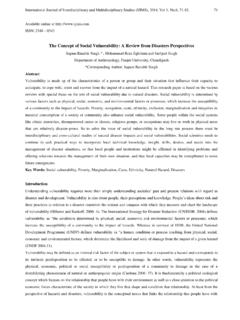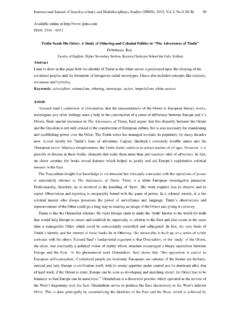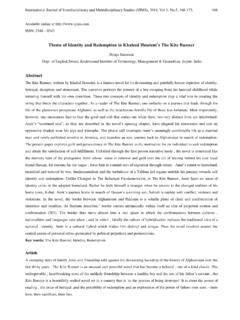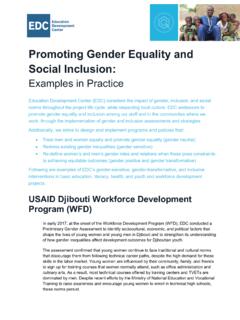Transcription of Problems Faced by LGBT People in the Mainstream Society ...
1 International Journal of Interdisciplinary and Multidisciplinary Studies (IJIMS), 2014, Vol 1, , 317-331. 317 Available online at ISSN: 2348 0343 Problems Faced by LGBT People in the Mainstream Society : Some Recommendations Chatterjee Subhrajit Researcher, Dept. of Sociology (The University of Burdwan) and Teacher (Sociology ), Usatpur S. High School, East Medinipur, , India Abstract LGBT has become a widely accepted designation for minorities based on sexual and gender orientation. All members of these subgroups are subject to similar prejudices rooted in beliefs and traditions about sexuality and gender. LGBT People , as members of a social minority group, are suffering from various forms of socio-economic and cultural injustice. The lacks of social recognition has an effect on the capacity of LGBT People to fully access and enjoy their rights as citizens.
2 They are more likely to experience intolerance, discrimination, harassment, and the threat of violence due to their sexual orientation, than those that identify themselves as heterosexual. Highlighting some major Problems Faced by LGBT People across the world is the theme of this article. Key Words: LGBT, Marginalization and Social Exclusion, Homophobia, Criminalization of homosexuality. Introduction Lesbian, gay, bisexual and transgender People are more likely to experience intolerance, discrimination, harassment, and the threat of violence due to their sexual orientation, than those that identify themselves as heterosexual. This is due to homophobia (the fear or hatred of homosexuality).
3 Some of the factors that may reinforce homophobia on a larger scale are moral, religious, and political beliefs of a dominant group. In some countries, homosexuality is illegal and punishable by fines, imprisonment, life imprisonment and even the death penalty. Human sexuality is diversely experienced, and can be fixed or fluid. Male/female sexuality is blurred further with the existence of transgender, transsexual and intersex identified People . Heterosexuality should no longer be assumed; this assumption is called heterosexism. Although many societies have made significant strides in human rights advocacy, LGBT rights struggle to find universal acceptance. The fact that the Universal Declaration for Human Rights, drafted in 1948, does not specifically include sexual orientation allows some People to consider LGBT rights debatable.
4 The declaration does however state: Everyone is entitled to all the rights and freedoms set forth in this Declaration without distinction of any Now more and more People are openly expressing their sexual orientation, and organizing and demanding their rights. Because of the work of these groups and their allies, acceptance of LGBT rights around the world is growing, and governments in certain countries are beginning to legislate in favor or LGBT rights and anti-discrimination laws. Influential international human rights organizations such as Amnesty International and Human Rights Watch continue to run effective campaigns. In the coming years the major issues for LGBT rights on a global scale will be: eradicating persecution based on sexual orientation; protection in the law from hate crimes and hate propaganda; equal rights and privileges (marriage, common law partnerships, medical-decision making, wills and estates, parenting and adoption) and to work and educate others on homophobia and heterosexism.
5 International Journal of Interdisciplinary and Multidisciplinary Studies (IJIMS), 2014, Vol 1, , 317-331. 318 Despite these encouraging realities, Deeply-embedded homophobic and transphobic attitudes, often combined with a lack of adequate legal protection against discrimination on grounds of sexual orientation and gender identity, expose many lesbian, gay, bisexual and transgender (LGBT ) People of all ages and in all regions of the world to egregious violations of their human rights. They are discriminated against in the labour market, in schools and in hospitals, mistreated and disowned by their own families. Th ey are singled out for physical attack beaten, sexually assaulted, tortured and killed. And in some 76 countries, discriminatory laws criminalize private, consensual same-sex relationships exposing individuals to the risk of arrest, prosecution, imprisonment even, in at least five countries, the death penalty.
6 Highlighting some major Problems Faced by LGBT People across the world is the theme of this article. Concept of LGBT: LGBT is an initialism that stands for lesbian, gay, bisexual, and transgender. The initialism LGBT is intended to emphasize a diversity of sexuality and gender identity-based cultures and is sometimes used to refer to anyone who is non-heterosexual or non cisgender instead of exclusively to People who are lesbian, gay, bisexual, or transgender. To recognize this inclusion, a popular variant adds the letter Q for those who identify as queer and/or are questioning their sexual identity as LGBTQ, recorded since 1996. Whether or not LGBT People openly identify themselves may depend on whether they live in a discriminatory environment, as well as the status of LGBT rights where one lives.
7 Before the sexual revolution of the 1960s, there was no common non-derogatory vocabulary for non heterosexuality; the closest such term, "third gender", traces back to the 1860s but never gained wide acceptance in the United States. The first widely used term, homosexual, was thought to carry negative connotations and tended to be replaced by homophile in the 1950s and 1960s, and subsequently gay in the 1970s. As lesbians forged more public identities, the phrase "gay and lesbian" became more common. Lesbians who held a more essentialist view that they had been born homosexual and used the descriptor "lesbian" to define sexual attraction, often considered the separatist, angry opinions of lesbian -feminists to be detrimental to the cause of gay rights. This was soon followed by bisexual and transgender People also seeking recognition as legitimate categories within the larger community.
8 After the initial euphoria of the Stonewall riots 1wore off, starting in the late 1970s and the early 1980s, there was a change in perception; some gays and lesbians became less accepting of bisexual or transgender People . It was thought that transgender People were acting out stereotypes and bisexuals were simply gay men or lesbian women who were afraid to come out and be honest about their identity. Each community that is collectively included has struggled to develop its own identity including whether, and how, to align with other gender and sexuality-based communities at times excluding other subgroups; these conflicts continue to this day2. Problems Faced by LGBT People : Lesbian, gay, bisexual, transgender (LGBT) People face tremendous difficulties growing up in a Society where heterosexuality is often presented as the only acceptable orientation and homosexuality is regarded as deviant.
9 They continue to face discrimination and exclusion across the world in all spheres of life. Homophobic violence and abuse targeting LGBT People occur on a regular basis. In most EU Member States, same-sex couples do not enjoy the same rights and protections as opposite sex couples, and consequently suffer from discrimination and disadvantage in access to social protection schemes, such as health care and pensions. In the labour market, a majority of LGBT People continue to hide their sexual orientation or to endure harassment out of fear of losing their job. Particularly vulnerable are young LGBT People who experience estrangement from family and friendship networks, harassment at school and invisibility, which can lead in some cases to underachievement at school, school drop-out, mental ill-health and homelessness.
10 This International Journal of Interdisciplinary and Multidisciplinary Studies (IJIMS), 2014, Vol 1, , 317-331. 319 discrimination not only denies LGBT People equal access to key social goods, such as employment, health care, education and housing, but it also marginalizes them in Society and makes them one of the vulnerable groups who are at risk of becoming socially excluded. Here I am highlighting some major Problems Faced by LGBT People across the world: and Social Exclusion: Marginalization is at the core of exclusion from fulfilling and full social lives at individual, interpersonal and societal levels. People who are marginalized have relatively little control over their lives and the resources available to them; they may become stigmatized and are often at the receiving end of negative public attitudes.










